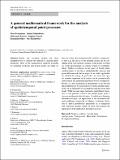A general mathematical framework for the analysis of spatiotemporal point processes
Author(s)
Ovaskainen, Otso; Finkelshtein, Dmitri; Kutoviy, Oleksandr; Cornell, Stephen; Bolker, Benjamin; Kondratiev, Yuri; Kutovyi, Oleksandr; ... Show more Show less
Download12080_2013_Article_202.pdf (608.6Kb)
PUBLISHER_POLICY
Publisher Policy
Article is made available in accordance with the publisher's policy and may be subject to US copyright law. Please refer to the publisher's site for terms of use.
Terms of use
Metadata
Show full item recordAbstract
Spatial and stochastic models are often straightforward to simulate but difficult to analyze mathematically. Most of the mathematical methods available for nonlinear stochastic and spatial models are based on heuristic rather than mathematically justified assumptions, so that, e.g., the choice of the moment closure can be considered more of an art than a science. In this paper, we build on recent developments in specific branch of probability theory, Markov evolutions in the space of locally finite configurations, to develop a mathematically rigorous and practical framework that we expect to be widely applicable for theoretical ecology. In particular, we show how spatial moment equations of all orders can be systematically derived from the underlying individual-based assumptions. Further, as a new mathematical development, we go beyond mean-field theory by discussing how spatial moment equations can be perturbatively expanded around the mean-field model. While we have suggested such a perturbation expansion in our previous research, the present paper gives a rigorous mathematical justification. In addition to bringing mathematical rigor, the application of the mathematically well-established framework of Markov evolutions allows one to derive perturbation expansions in a transparent and systematic manner, which we hope will facilitate the application of the methods in theoretical ecology.
Date issued
2013-10Department
Massachusetts Institute of Technology. Department of MathematicsJournal
Theoretical Ecology
Publisher
Springer Netherlands
Citation
Ovaskainen, Otso, Dmitri Finkelshtein, Oleksandr Kutoviy, Stephen Cornell, Benjamin Bolker, and Yuri Kondratiev. “A General Mathematical Framework for the Analysis of Spatiotemporal Point Processes.” Theor Ecol 7, no. 1 (October 22, 2013): 101–113.
Version: Author's final manuscript
ISSN
1874-1738
1874-1746